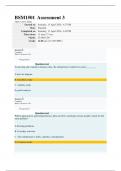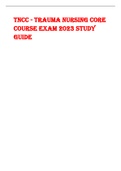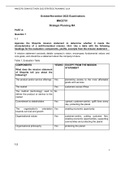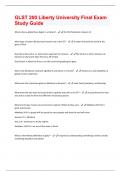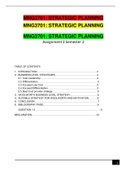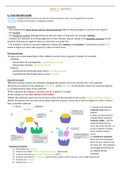International Trade Law
Readings 2: Dispute Settlement
Van den Bossche & Zdouc, The Law and Policy of the World Trade
Organisation
Chapter 3: WTO Dispute Settlement
Introduction
One of the core functions of the WTO operational for more than
two decades 20% of the disputes were resolved by amicable
means
Developed and developing countries alike make use of the dispute
settlement system
There were a lot of controversial cases (US – Shrimp, EC –
Hormones, etc.)
WTO DSS is based on GATT 1947 Article 3.1 of the DSU, building
upon the case law of the GATT-DSS, which had its shortcomings
(adoption of rulings by consensus)
Jurisdiction of the WTO Dispute Settlement System
Nature of the Jurisdiction
Compulsory Jurisdiction
Article 6.1 of the DSU membership means acceptance of the
WTO DSS
Exclusive Jurisdiction
Article 23.1 of the DSU protects the exclusivity of the WTO and
protects the multilateral system from unilateral conduct Article
23.2(a) of the DSU provides that Members may only state that
something violates WTO rules after it has gone to dispute
settlement
Contentious Jurisdiction
Only contentious, and thus does not render advisory opinions
Article 3.2 of the DSU states that the WTO DSS is only called upon
in the context of the dispute
Scope of the Jurisdiction
1
,Disputes Subject to WTO Dispute Settlement
Article 1.1 of the DSU ratione materiae jurisdiction over disputes
arising under the covered agreements see Appendix 1 of the DSU
Measures Subject to WTO Dispute Settlement
In US – Corrosion-Resistant Steel Sunset Review, the AB noted that
it shall be any measure which can be attributable to a WTO member
can be scrutinised
Acts of private parties Japan – Film, Panel: government
involvement + Article 8 of ARSIWA
Measure which expire or are withdrawn during the proceedings
China – Raw Materials, AB: depends on the merits of the case, but
recommendations cannot be made
Legislation as such the application can be challenged, but the
law as it stands (without being applied) can in line with US – 1916
Act be challenged independently of the application (see also US –
Corrosion-Resistant Steel Sunset Review (to protect stability) and
US – Oil Country Tubular Goods Sunset Reviews (claims should be
made clear!))
Discretionary legislation (leeway legislation) not determinative of
the question of WTO consistency, however, may inform whether the
measure can operate WTO-consistently (US – Corrosion-Resistant
Steel Sunset Review)
Unwritten norms or rules US – Zeroing, AB: measure must
analysed on the basis of its content and substance, and not on its
form complainant must establish attributability, content, and that
the rule or norm does have general and prospective application
Ongoing conduct US – Continued Zeroing, AB: no reason to
exclude it (such as the concerted practice in EC and certain
member States – Large Civil Aircraft)
Measures composed of several diferent instruments Argentina –
Import Measures, AB: when challenged together, diferent
components need to be proven to operate together as part of a
2
, single measure and how a single measure exists as distinct from its
components
Measures by regional or local authorities Article 22.9 of the DSU:
yes
When EU is concerned, one can bring an action against the MS,
against the EU and the MS, or only against the EU if brought
against MS, the EU defends it in the proceedings
Access to the WTO Dispute Settlement System
Right of Recourse to WTO Dispute Settlement
i.e. Article XXIII:1 of the GATT 1994 sets out when a member can
have recourse to dispute settlement
WTO provides for violation-, non-violation- and situation complaints
for the former, nullifcation or impairment is presumed (and can
usually not be rebutted) and for the latter two the claimant must
prove nullifcation or impairment
Non-violation claims have to date been unsuccessful and there has
never been adjudication on situation complaints
Articles 3.7 and 3.10 of the DSU limit the members ‘fruitful’
action and ‘in good faith in an efort to resolve the dispute’ the
former is not analysed by the AB or the panel
Members will never really relinquish their right to recourse to WTO
dispute settlement, even if they agreed explicitly to a violating
provision (such as in Peru – Agricultural Products)
Access of Members other than the Parties
Article XXII of the GATT 1994 consultations: members with a
substantial trade interest may partake
Article 10 of the DSU substantial interest (NOT TRADE) means
that they can participate in the proceedings as a third party and in
the subsequent AB proceedings
Indirect Access to the WTO Dispute Settlement System
Only states have access, but if private parties lobby the state to
lodge their claim in front of the WTO, they have indirect access
3
Readings 2: Dispute Settlement
Van den Bossche & Zdouc, The Law and Policy of the World Trade
Organisation
Chapter 3: WTO Dispute Settlement
Introduction
One of the core functions of the WTO operational for more than
two decades 20% of the disputes were resolved by amicable
means
Developed and developing countries alike make use of the dispute
settlement system
There were a lot of controversial cases (US – Shrimp, EC –
Hormones, etc.)
WTO DSS is based on GATT 1947 Article 3.1 of the DSU, building
upon the case law of the GATT-DSS, which had its shortcomings
(adoption of rulings by consensus)
Jurisdiction of the WTO Dispute Settlement System
Nature of the Jurisdiction
Compulsory Jurisdiction
Article 6.1 of the DSU membership means acceptance of the
WTO DSS
Exclusive Jurisdiction
Article 23.1 of the DSU protects the exclusivity of the WTO and
protects the multilateral system from unilateral conduct Article
23.2(a) of the DSU provides that Members may only state that
something violates WTO rules after it has gone to dispute
settlement
Contentious Jurisdiction
Only contentious, and thus does not render advisory opinions
Article 3.2 of the DSU states that the WTO DSS is only called upon
in the context of the dispute
Scope of the Jurisdiction
1
,Disputes Subject to WTO Dispute Settlement
Article 1.1 of the DSU ratione materiae jurisdiction over disputes
arising under the covered agreements see Appendix 1 of the DSU
Measures Subject to WTO Dispute Settlement
In US – Corrosion-Resistant Steel Sunset Review, the AB noted that
it shall be any measure which can be attributable to a WTO member
can be scrutinised
Acts of private parties Japan – Film, Panel: government
involvement + Article 8 of ARSIWA
Measure which expire or are withdrawn during the proceedings
China – Raw Materials, AB: depends on the merits of the case, but
recommendations cannot be made
Legislation as such the application can be challenged, but the
law as it stands (without being applied) can in line with US – 1916
Act be challenged independently of the application (see also US –
Corrosion-Resistant Steel Sunset Review (to protect stability) and
US – Oil Country Tubular Goods Sunset Reviews (claims should be
made clear!))
Discretionary legislation (leeway legislation) not determinative of
the question of WTO consistency, however, may inform whether the
measure can operate WTO-consistently (US – Corrosion-Resistant
Steel Sunset Review)
Unwritten norms or rules US – Zeroing, AB: measure must
analysed on the basis of its content and substance, and not on its
form complainant must establish attributability, content, and that
the rule or norm does have general and prospective application
Ongoing conduct US – Continued Zeroing, AB: no reason to
exclude it (such as the concerted practice in EC and certain
member States – Large Civil Aircraft)
Measures composed of several diferent instruments Argentina –
Import Measures, AB: when challenged together, diferent
components need to be proven to operate together as part of a
2
, single measure and how a single measure exists as distinct from its
components
Measures by regional or local authorities Article 22.9 of the DSU:
yes
When EU is concerned, one can bring an action against the MS,
against the EU and the MS, or only against the EU if brought
against MS, the EU defends it in the proceedings
Access to the WTO Dispute Settlement System
Right of Recourse to WTO Dispute Settlement
i.e. Article XXIII:1 of the GATT 1994 sets out when a member can
have recourse to dispute settlement
WTO provides for violation-, non-violation- and situation complaints
for the former, nullifcation or impairment is presumed (and can
usually not be rebutted) and for the latter two the claimant must
prove nullifcation or impairment
Non-violation claims have to date been unsuccessful and there has
never been adjudication on situation complaints
Articles 3.7 and 3.10 of the DSU limit the members ‘fruitful’
action and ‘in good faith in an efort to resolve the dispute’ the
former is not analysed by the AB or the panel
Members will never really relinquish their right to recourse to WTO
dispute settlement, even if they agreed explicitly to a violating
provision (such as in Peru – Agricultural Products)
Access of Members other than the Parties
Article XXII of the GATT 1994 consultations: members with a
substantial trade interest may partake
Article 10 of the DSU substantial interest (NOT TRADE) means
that they can participate in the proceedings as a third party and in
the subsequent AB proceedings
Indirect Access to the WTO Dispute Settlement System
Only states have access, but if private parties lobby the state to
lodge their claim in front of the WTO, they have indirect access
3



